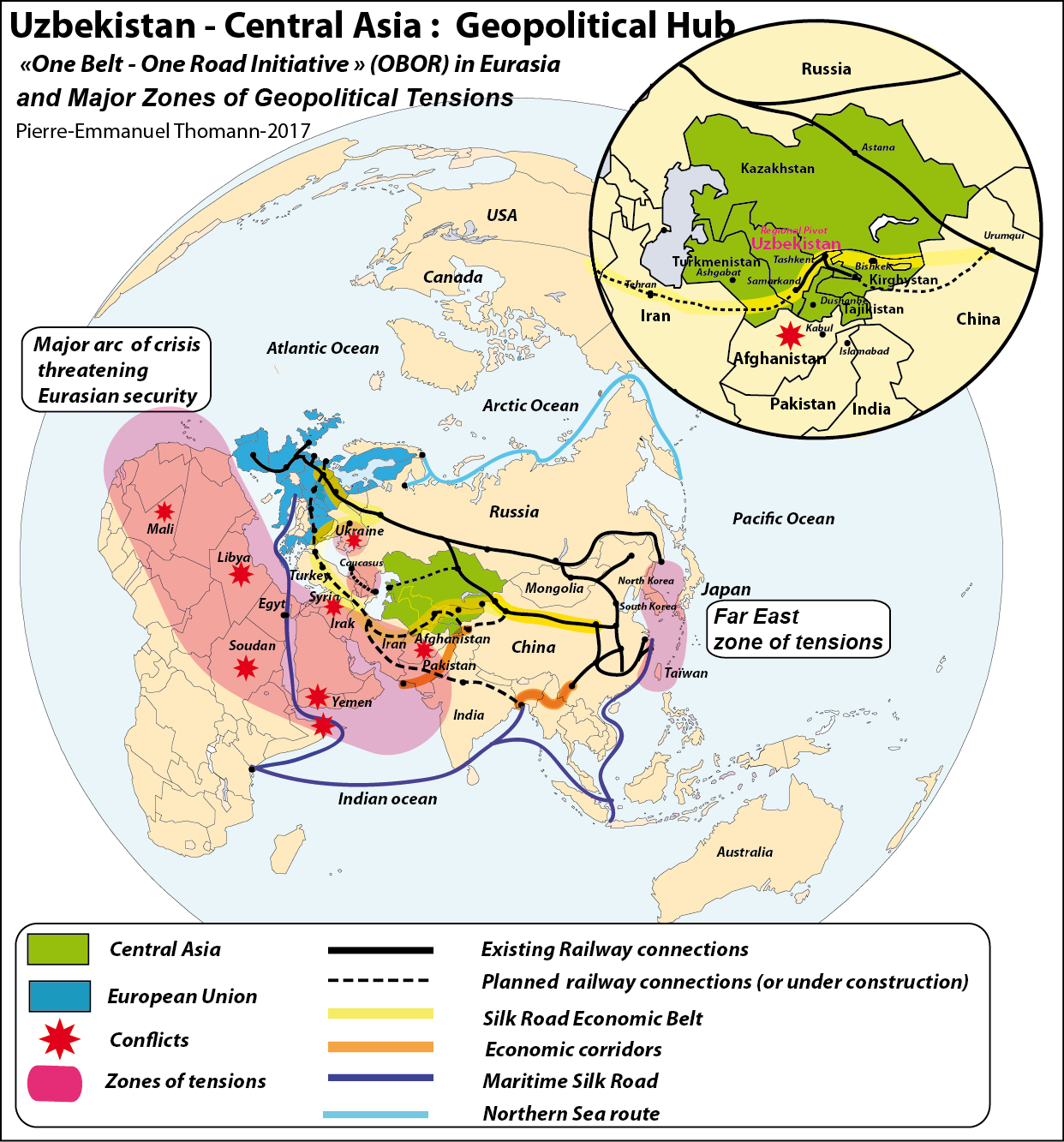
Transport, logistics, energy, trade and education projects in Afghanistan are at the core of Uzbek strategy to stabilize Afghanistan
During his address on the 28 of December 2018 to Oliy Majlis ( Parliament of Uzbekistan); the President of the Republic of Uzbekistan Mr. Shavkat Mirziyoyev underlined hat Uzbekistan has begun to implement large joint projects on transport and logistics, energy, trade and education in Afghanistan.
-The energy line «Surkhon-Puli Khumri» is being constructed by Uzbekistan,
– the Education center in Termez city to educate Afghan citizens,
– logistic center «Termez-cargo» possessing its own customs station,
-development of railway line «Mazari Sharif-Herat» and «Mazari Sharif-Kabul-Peshawar».
These projects are part of Uzbek strategy in solving the Afghan problem. The main priority result is to begin peace talks in Afghanistan and to reach national reconciliation
The overall Uzbek strategy in Afghanistan, was promoted during the Tashkent Conference on Afghanistan “Peace Process, Security Cooperation and regional Connectivity” and was held on the 27th of march 2018. The President of the Republic of Uzbekistan Shavkat Mirziyoyev participated at this international conference, together with the president of Afghanistan, His Excellency President Mr. Ashraf Ghani and High Representative/Vice-President of the European commission Federica Mogherini. This conference attracted representatives from all over the world since the heads and representatives of foreign policy institutions of the People’s Republic of China, Russian Federation, United States of America, Japan, Germany, Great Britain, France, Italy, Turkey, India, Iran, Pakistan, Saudi Arabia, United Arab Emirates, Qatar, Kazakhstan, Kyrgyzstan, Tajikistan and Turkmenistan, as well as international and regional organizations participated to this event, underlying the geopolitical importance of the thematic. It should be noted that the representatives of all permanent Member States of the UN Security Council and countries of the Shanghai Cooperation Organization were represented.
Uzbekistan was a peripheral territory of Soviet Union and acquired after independence a more central position with the end of bipolarity and the emergence of a multipolar world. Uzbekistan is now surrounded and courted by strong state powers competing for geopolitical influence. This situation can bring advantages as opportunities emerge from all directions, but the balance of interests of international partners has to be constantly and carefully measured.
To preserve its sovereignty, security and reach prosperity, the Uzbek state has developed « realpolitical skills » with a doctrine of multivectorial foreign policy, similar to the balance of power, but is also eager to project stability. It is the more adapted posture to position itself in a highly complex region.
Since the election of the new president of Uzbekistan, Central Asia became the core priority of Uzbekistan’s foreign policy, and the new doctrinal focus is about creating stability, security and good-neighbourliness belt around Uzbekistan. The objective is to take advantage of the huge unrealized potential of the region. Uzbekistan has a common border with all other Central Asian states.
Not surprisingly, the Afghan conflict stays the biggest threat for Uzbekistan a front-line state bordering the conflict. The geographical position of Uzbekistan as a neighbor of Afghanistan and a pivot in central Asia, gives the country a particular role to contain instability and contributing to a more secure future for the whole of Eurasian continent.
If Afghanistan is stabilized, then the Afghan soil will open up the new opportunities and bring benefits to all states of the Eurasian continent. It will strengthen common security and stability, create favourable conditions for the New Silk road project, with the construction of motorways, railroads, pipelines and development of regional and trans-regional trade.
Uzkekistan has a special interest in becoming a hub at the crossroads of to this new emerging geo-economic configuration. Uzbekistan plans to launch the trans-Afghan transport-communication projects in close integration with other projects like the Uzbekistan–Turkmenistan–Iran–Oman and Uzbekistan-Kyrgyzstan–China corridors. It will create the conditions for the development of intercontinental transport corridors in almost all directions through the shortest route, from north to south and from east to west.
Central Asia plays is playing the role a buffer zone barring instability and further Eurasian fragmentation coming from external crisis and instability from Afghanistan. Central Asian region aspires now to become a pole in its own right. As a strong civilizational pole associated with a new Central Asian Renaissance, the region is containing and preventing the proliferation of religious extremism. European security is intertwined with Central Asia, since this region is becoming one of the major pivots of the Eurasian continent.
Cooperation on transnational terrorism, the issue of radicalisation, the stabilisation process in Afghanistan between European Union and Central Asian states is therefore a necessity.